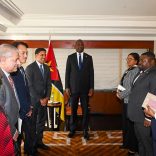Mozambique: LAM restructuring process demands reducing number of employees - AIM | Watch
Société Générale in Mozambique: A two-step strategy

Courtesy from Société Générale / Société Générale's new headquarters in Maputo (Moçambique)
The French multinational financial services group unveiled Thursday its new headquarters in the Mozambican capital. It aims at developing a strong franchise in both corporate and retail banking in a two-step strategy. It is the first implantation of Société Générale in an eastern African Portuguese-speaking country, after more than 50 years of uninterrupted activities in the sub-Saharan continent. Trade finance, structured finance but also mobile banking in Mozambique will be the key areas in which the banking giant intends to become a leader.
The banking system in Africa could become a model for mature, developed economies. Paradoxically, it is because the sub-Saharan banking system is still underdeveloped that it offers the biggest opportunities for innovation in a highly regulated and capital-intensive sector. It is, at least, the conviction – and hope – of Société Générale Mozambique (SocGen Mozambique), which inaugurated Thursday its new headquarters in Maputo.
The logic behind this reasoning is simple. The only way to give access to low-income potential customers in Mozambique, for instance, consists in dematerializing the system. That is, making an extensive use of mobile technology. “Distribution costs of a Western-based, typical network are excessively high in poor countries”, insists Alexandre Maymat, deputy head of International Banking & Financial Services and head of Africa, Aisa, Mediterranean & Overseas Region at Société Générale.
Alexandre Maymat adds that the most basic cash operations are far from efficient in Africa, profitability per individual being extremely low. On top of that, banks, like any corporation, must deal with critical external issues such as security, energy (power generation) as well as with all the financial and technical burdens associated with a suitable IT infrastructure. In Africa, thus, a traditional banking enterprise can easily turn into fiasco.
However, the more-than-a-century old French banking group has a strong experience in the continent, as it has been operating in the region for more than 50 years. It also has a well-defined two-step strategy. The first one consists in emphasizing on the very DNA of SocGen, namely corporate finance, in the segment of trade finance, in particular, one of the bank’s strongest franchises.
In this respect, SocGen is already an adviser to the American petroleum and natural gas exploration and production company Anadarko, who discovered more than 75 trillion cubic feet (Tcf) of recoverable natural gas resources in Offshore Area 1 in the Rovuma Basin (northern part of the country). SocGen is also the financial adviser to the Italian energy giant ENI in Mozambique.
The French bank also features among the top global leaders in structured finance and aims at offering the Mozambican Government the capacity to fund vital infrastructure projects. Macroeconomic headwinds that are so typical in emerging and developing economies do not deter SocGen in this respect.
For example, in 2014, in Ivory Coast, just after a two-year long civil war, SocGen co-arranged with the International Finance Corporation (IFC) a USD 300 million revolving credit facility that enabled Société Ivoirienne de Raffinage (SIR) to provide refined fuel essential for day-to-day life and commerce in West Africa. At the time, Ivory Coast faced a financial crisis, accumulating arrears, just as Mozambique today.
“Sure, a few commodity-based projects have been delayed due to the financial crisis in Mozambique”, explains Alexandre Maymat. “However, we are confident that the measures recently taken so far by the central bank, such as increasing transparency and establishing a unique benchmark rate, will have a positive impact in the country, while discussions between the International Monetary Fund and the Mozambican Government, are, it seems to me, going in the right direction.”
The second step in the bank’s strategy will consist in developing a strong and widespread retail franchise, from south to north. Mobile banking will be at the core of this strategy as it is particularly suited for low-income customers in the developing world. The majority of which are located in very remote areas.
“We plan to offer the informal sector the whole range of retail services through our own mobile wallets, from basic cash payments and money transfers to more complex credit and savings solutions”, specifies Alexandre Maymat. “We will have to go and be present where no other traditional bank has gone so far, thanks to mobile-based technology, which has the advantage to enable all types of private – and institutional – customers to bank anywhere, anytime.”
That’s actually where Africa may have an edge in terms of ease of adaptation to a completely new banking operational framework. Whereas in the developed world, legacy infrastructure and cultural consumption habits somewhat prevent such mobile banking solutions to deeply penetrate the market, while the trend, nevertheless, seems unstoppable there too.
“It is conceivable that in a few years, the African mobile baking industry will become a benchmark for mature economies”, anticipate SocGen’s head of Africa. Indeed, not only such model is cost efficient from the banking industry perspective, but also highly convenient for customers in all parts of the world.
While some major banks favor strategic alliances with telecom operators in order to deploy their mobile services, SocGen rather intends to become their direct competitors. “A bank has a few strategic assets that a telco does not have. These include a unique knowledge about the specific banking needs of clients and a proper banking license to make credit and receive savings/deposits in formal and informal sectors”, argues Alexandre Maymat.
Moreover, mobile banking is not new to SocGen. In 2015, it launched the first stage in the new Pan-African multi-channel offering developed to meet the specific needs of African clients through a new mobile banking offering, developed with the support of IBM and Monitise. Traditional services of account consulting, bank transfers, invoice payment and secure messaging systems feature among the main services that the bank offers on the continent.
For the record, SocGen started operations in Mozambique in 2015 through an USD 18 million capital increase of Mauritius Commercial Bank (MCB), which resulted in a 65% capital ownership for SocGen, which is now the main shareholder. The bank spent another USD 13 million on IT infrastructure and plan to add significant investment in the medium and long term.
“It is SocGen’s first implantation in Eastern Africa”, underscores Laurent Thong-Vanh, chief executive officer at SocGen Mozambique. Though the commodity sector attracts the bulk of global attention, the French bank will closely follow all development related to the agri-business sector, a typically high growth industry in developing economies.
One of the key components of the financial services company consists in creating synergies between its multiple markets around the world to the benefit of Mozambique. “We also hired Chinese bankers to enhance our offering to Chinese companies in Mozambique. Indian bankers will do the same for Indian companies, while Brazilian bankers will assist Brazilian firms operating in the country”, details Laurent Thong-Vanh.
The CEO also stresses about the importance to have Mozambican bankers at the core of its operations. “They are the ones who have the best knowledge of the Mozambican business and social environment. Our success will really depend on them”, insists the CEO. Who adds “that there is no such thing as a good or bad bank, but only good or bad bankers”. To that effect, SocGen has developed a training program to ensure that it will hire and promote the best bankers locally.
By Levy-Sergio Mutemba












Leave a Reply
Be the First to Comment!
You must be logged in to post a comment.
You must be logged in to post a comment.